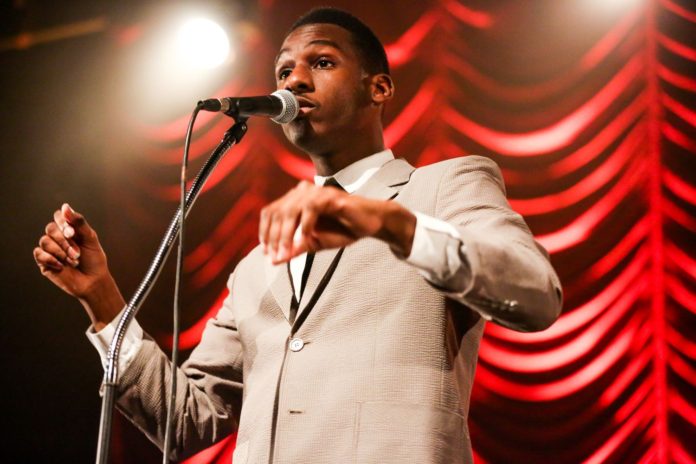It’s been about two years since a set of vintage recording equipment was carried into an empty warehouse space to record the album of then-unknown R&B singer Leon Bridges. The makeshift studio, located at the Supreme Golf Warehouse on Fort Worth’s southside, had blankets for walls and an old putting green on the floor, but somehow, it all came together to create that old-school sound Bridges is known for.
Now Bridges is everywhere – he’s toured the globe, earned a Grammy nomination, appeared in a TV commercial and performed for President Barack Obama.
Meanwhile back in Fort Worth, the studio – where Bridges recorded his debut album full of vintage sounds – isn’t so makeshift anymore. The studio has a name – Niles City Sound – and its partners Chris Vivion, Austin Jenkins and Josh Block renovated part of the space to turn it into a full-fledged studio.
The studio is a dream fulfilled, especially for Jenkins and Block. Jenkins said back in August that he and Block were long-time collectors of old recording gear like amplifiers and tape machines. Starting a recording studio was something they had always talked about but never saw come to fruition. It was when they met Bridges that they finally had a project that could put their recording equipment to use and turn their studio dream into a reality.
Now at Niles City Sound, Jenkins has assumed the role of musical director, and Block works as technical director.
Vivion, who serves as the director of operations at Niles City Sound, gave Fort Worth Business an idea of what the studio is like inside.
How’s the studio doing after Leon Bridges? Is it just a personal studio, or is it open to other acts that want to come in and record?
Niles is more than a recording studio. The facility itself is just a tool to produce high quality recordings. We intend to help an artist find the appropriate record label, publishing company, booking agent, entertainment lawyer and manager to get their career moving and working for them.
What makes Niles City Sound unique to other recording studios?
Niles is one big tracking room, which is geared towards artists who wish to record live. The room is 1,300 square feet with a 17-foot high ceiling and a second floor control room overlooking the tracking room. This is a big departure from modern recording practices. Most modern studios are partitioned to allow for separation.
Can you tell us about some of the equipment in the studio? What are some examples of gear that artists can find in there?
We have five multi-track, multi-format tape machines. Our emphasis is on analog recording rather than digital. There is a hi-fi quality to tape, which is nearly impossible to duplicate with modern digital gear. We use mil-spec tube preamplifiers dating as far back as the 1940s. This equipment was designed for high headroom and high-quality reproduction, while retail price was the afterthought. Quality above all else.
What’s your personal favorite piece of equipment in the studio?
We all have our favorite pieces. The collection is curated with the main thought being, whatever sounds the best, whether it be vintage or modern. It’s always in our thought process, that we should use whatever will best serve the artist.
What’s it like to run a recording studio as a business? Is it easier or a little more difficult to run a business in this industry, as opposed to, like say, the food industry, oil industry, etc.?
There must be easier ways to make a buck than the recording studio business. I think that everyone who goes down this road just loves what they do.
Has picking up clients been easy? Or do you have to do a little marketing to have artists come by?
So far, we have been blessed with highly talented artists interested to work at Niles.
What are some projects that you’re currently working on?
We have several projects in the works. I am not able to comment on them at the moment however.
Is running a recording studio all “fun and games,” or does the job come with challenges? What are some of the challenges a prospective studio owner needs to be aware of?
It’s countless hours of work. Good thing we enjoy it. If you love what you do, then it does feel like fun and games.
What’s the most fun or rewarding part of being in the recording business?
Working with talented songwriters is a gratifying experience. It makes, coming to work, never feel old.
What’s your advice to someone who wants to start his or her recording studio? Would you recommend them starting from the ground up, or waiting a few years to collect equipment and save up money before renting out a space?
In our case, we have been collecting the gear that we use for years. It would have been nice to come out of the gate with a building and gear all at once, but the investment is considerable. I would say that whatever works for an individual is the best way. Educate yourself as much as possible!
Finally, where do you see Niles City Sound headed in the future?
There are some great artists and organizations in Fort Worth that work hard every day to elevate the position of this city on the world stage. We want to do our part.
_______________
Niles City Sound
What was Niles City?
Niles City was basically where the Fort Worth Stockyards are now. According to the Texas State Historical Association, the town, incorporated in 1911, was called “the richest little city in the state of Texas” because of the high value of several corporations – the Swift and Armour packing companies in particular – located in the area. Niles City became a part of Fort Worth in August 1923.






